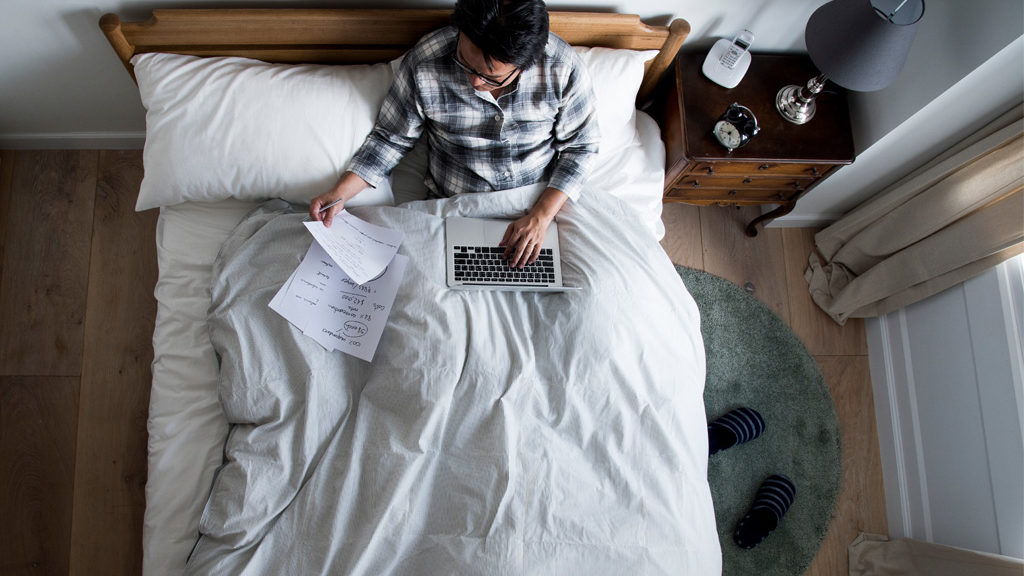
62% Of Millennials Are More Stressed Working From Home
There is no doubt that individuals who have optimized the comfort of the home environment, especially the bedroom, during remote working periods are the ones who are getting quality sleep. Stress and sleep are very closely linked
NORTH HOLLYWOOD, Calif. (PRWEB)
October 15, 2020
US mattress company, Puffy, has just released results from a national sleep survey of over 4,400 adults from all 50 American states. The 2020 sleep quality survey reveals that while 74% of people prefer working from home remotely, the vast majority of adults are going to sleep later, are less satisfied with sleep quality, and feel more stressed. Millennials are the most impacted demographics, with over 62% reporting higher stress levels while remote working during Covid.
Data indicates the lowest levels of stress are apparent in adults who set up a home office instead of working in the bedroom or living room. 54% of baby boomer respondents worked out of a home office, while only 20% of Gen Z and millennials set up a home office for remote working. Puffy Sleep Survey data also highlights a close link between remote working space and productivity.
Baby boomer respondents report the highest rates of working from home preference, increased productivity, and the lowest work stress rates. About 79% of baby boomers surveyed prefer working from home, 55% indicate less work stress, and 68% cite higher productivity levels compared to working at the office.
Conversely, only 20% of millennials worked from a home office, 42% worked out of their bedroom, and 62% felt they had more work stress then they did before lockdown. Surprisingly, the hyper-connected and “digitally-native” millennial generation is struggling to adapt to the rapidly changing living and working conditions as a result of Covid. Experts cite multiple factors that may be impacting millennials such as increased distractions (housemates, young children), lack of engagement, loneliness, and limited space in the house to work and rest.
“Young parents who used to work outside of the home have had to make huge changes in recreating their offices, their schedules, and their mindsets in order to work at home. Families with children in daycares, preschools, elementary schools, or in-home care services have had to make drastic decisions without the benefit of a model or even a definitive timeline.” said Sleep Education Expert, Joan Canning.
Shortly after Covid was declared a pandemic, over 88% of US organizations transitioned to various remote working arrangements. Findings from our sleep survey indicate that despite the overall majority of respondents preferring remote working (74%), it is evident that separating work and rest areas can contribute to effective stress management and productive output.
“When conducting this survey, we set out to further explore the relationship between home decor and how it can impact lifestyle factors such as productivity and stress. We did not expect that such high proportions of individuals worked out of a bedroom. We’ve always contented the bedroom should be reserved for quality sleep. We intend to use these findings to inform people about the best ways to arrange bedroom and home decor in ways that allow them to work effectively. The environment we live in plays a major role in mental health and well-being,” said Puffy CEO Arthur Andreasyan.
Furthermore, the data suggests that sleep satisfaction is plummeting across all demographics, older adults in particular. Although seasoned professionals seem to be transitioning to remote work with greater ease than younger workers, only 27% of respondents above 55 report sleep satisfaction. Gen Z (18 – 24-year-olds) report the highest sleep satisfaction among all demographics (48%) and they are the one that spent the most time redecorating during lockdown (26%). The trend of an upsurge of home decorating by young Americans correlates with increased rates of sleep satisfaction.
“There is no doubt that individuals who have optimized the comfort of the home environment, especially the bedroom, during remote working periods are the ones who are getting quality sleep. Stress and sleep are very closely linked, so the more support we can give our body during peak stress periods, the better the mind and body can respond when it’s time to switch off and rest,” said Puffy CEO Arthur Andreasyan.
To view comprehensive insights into Puffy’s Sleep Quality Survey click here: https://puffy.com/pages/sleep-survey?utm_campaign=press-release&utm_medium=news&utm_source=prweb&utm_term=sleep-survey
###
About Puffy
Puffy is a mattress and bedroom company currently operating in the United States and Canada. Puffy is deeply rooted in its commitment to develop complete bedroom solutions to help people sleep better and live better. Famous for inventing mattresses that feel like sleeping on a cloud, Puffy aims to deliver luxurious world-class comfort to transform sleep experiences worldwide.
Puffy sells all products direct-to-consumers online and was recently awarded Best Mattress of 2020. Puffy. For more information visit https://puffy.com.
Share article on social media or email:

